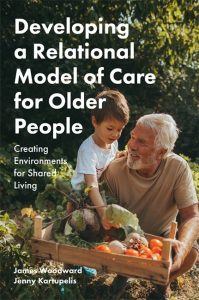‘It’s no fun getting older – just you wait’ was the challenge posed by a woman who in her 80s was embracing some slowing up and her need for help. She had spent four decades teaching children and now felt vulnerable and marginalised. ‘I feel invisible, overlooked and misunderstood’ was how she expressed the challenge and opportunity to flourish in all stages of our lives.
The question: What are older people for, is perhaps one of the most fundamental moral challenges facing modern life. What is the purpose of life in old age? What can older people contribute to our communities? There is a liberation in older age that is rooted in an increased awareness of mortality combined with the wisdom that comes from knowing one’s own limitations and failings. ‘I live more intensely in the present moment’ was the way it was expressed by my friend. This spiritual generativity works to increase a sense of the power and possibility of religion. It is no accident that are churches are full of older people. ‘There can often be a tension between how we ourselves feel and how society sees us.’ This generation volunteers, is generous with time, and cares about the creation of a better world. It is deeply committed to seeing children and grandchildren flourish. Is a time for spiritual adventure and of a deep knowing? Many older people are experiencing an awakened life – an understanding that freedom is the absence of unnecessary restrictions on how life should be lived. Intentional and reflective life experience can bring increased texture, depth and pragmatism to living, our choices and the quality of relationships. These gifts enlarge the purposefulness all life especially for older people.
What then is the relationship between independence and dependence? We are all ageing. Being more intentional about reflecting on the shape of ageing both in and around us might just be a key that unlocks potential for are flourishing. All of us – at whatever age – have to deal with unavoidable dependency. We should not underestimate the social isolation of many older people in our communities. Independence may be just another word for loneliness. Nurturing a community where generations connect, where we resource shared living arrangements for older people, where we are intentional around developing relationships with those who find themselves lonely provides transforming opportunities to strengthen relationships and deepen care.
Why nurture this inclusivity? Attitudes to ageing and older people affect all of our health and well-being. We know that negative attitudes to old age can shorten your life. We tolerate ageist assumptions and attitudes that stereotype older people as lonely, vulnerable, in poor mental and physical health. This discrimination is unacceptable. Justice is an intergenerational issue where marginalisation has no place in a modern democracy. We nurture inclusivity by listening. This listening breaks down the walls of isolation. An ageing society is an opportunity to learn about being human and having very different ways of being and knowing. Older people can offer us an opportunity to model how we live and learn from being human, creatures who are both finite and fragile. Faith communities should lead the way.
The Revd Professor James Woodward
Principal of Sarum College
This is an expanded introduction to the launch of Developing a Relational Model of Care for Older People : Creating Environments for Shared Living by James Woodward and Jenny Kartupelis ( Jessica Kingsley Publishers 2018) at Church House Bookshop 4 June 2018
